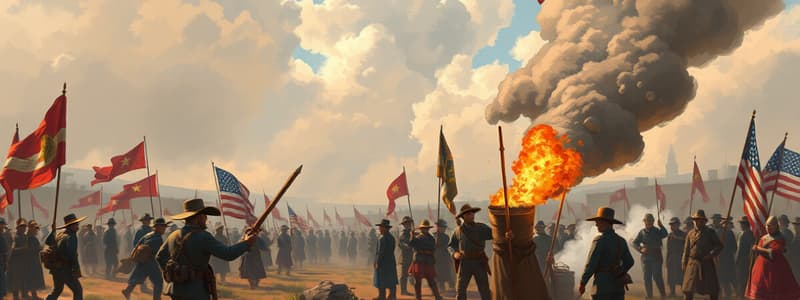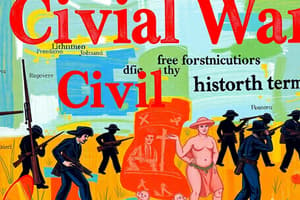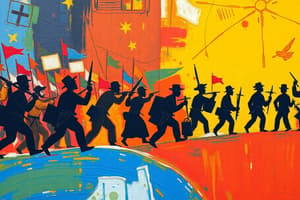Podcast
Questions and Answers
What is popular sovereignty?
What is popular sovereignty?
- Political authority belongs to the government.
- Political authority belongs to the people. (correct)
- Political authority is held by a monarch.
- Political authority is determined by military power.
What political party was dedicated to stopping the expansion of slavery?
What political party was dedicated to stopping the expansion of slavery?
Free Soil Party
What does secession refer to?
What does secession refer to?
The withdrawal of eleven southern states from the Union.
The ______ of 1820 and 1850 forestalled the Civil War by installing the Fugitive Slave Act.
The ______ of 1820 and 1850 forestalled the Civil War by installing the Fugitive Slave Act.
What did the Kansas-Nebraska Act allow?
What did the Kansas-Nebraska Act allow?
Who wrote 'Uncle Tom's Cabin'?
Who wrote 'Uncle Tom's Cabin'?
What was the Dred Scott Decision?
What was the Dred Scott Decision?
What was the Confederate States of America?
What was the Confederate States of America?
Who was Jefferson Davis?
Who was Jefferson Davis?
Which states are known as the border states during the Civil War?
Which states are known as the border states during the Civil War?
What role did Robert E. Lee play in the Civil War?
What role did Robert E. Lee play in the Civil War?
What did the Emancipation Proclamation do?
What did the Emancipation Proclamation do?
Who founded the American Red Cross?
Who founded the American Red Cross?
The Iron Clads were wooden ships.
The Iron Clads were wooden ships.
What led to bloody draft riots in New York City?
What led to bloody draft riots in New York City?
Study Notes
Key Terms and Concepts
-
Popular Sovereignty
- Political authority belongs to the people; a fundamental principle of the U.S. Constitution.
- Viewed as essential to American rights and governance.
-
Free Soil Party
- A political party (1847-1848) formed to halt the expansion of slavery.
- Influence contributed to the establishment of the Republican Party in 1854.
-
Secession
- The act of eleven southern states withdrawing from the Union in 1860, leading to the Civil War.
- Key event that intensified the conflict between North and South.
-
Compromise of 1820 & 1850
- Legislative measures aimed at averting Civil War by enacting the Fugitive Slave Act and abolishing the slave trade in Washington, D.C.
- Allowed California's admission as a free state and implemented popular sovereignty in new territories.
-
Kansas-Nebraska Act
- Enacted in 1854, permitted Kansas and Nebraska to decide their status on slavery.
- Led to significant conflict as pro-slavery activists attempted to influence the vote.
-
Uncle Tom's Cabin
- A novel by Harriet Beecher Stowe (1853) that changed public perception of slavery in America and abroad.
- Played a pivotal role in galvanizing anti-slavery sentiments.
-
John Brown
- An abolitionist executed for leading a failed raid on Harpers Ferry, Virginia (1800-1858).
- Became a martyr for the anti-slavery movement.
-
Dredd Scott Decision
- Supreme Court ruling that denied freedom to Dredd Scott, a slave who argued that residency in free territory made him free.
- Increased tensions that contributed to the Civil War.
-
Confederate States of America
- Republic established in February 1861 by eleven southern states that seceded from the U.S.
- Sought to create a government based on states' rights and slavery.
-
Jefferson Davis
- President of the Confederate States from 1861 to 1865.
- Distinguished political career included roles as Secretary of War and U.S. Senator from Mississippi.
-
Border States
- States (Delaware, Maryland, Kentucky, Missouri) that were slave-holding but remained with the Union during the conflict.
- Played a crucial role due to their strategic locations.
-
Robert E. Lee
- Confederate General initially opposed to secession; opposed using force to maintain the Union.
- Commanded the Army of Northern Virginia throughout the Civil War.
-
U.S. Grant
- Union General who became the first president after the Civil War; defeated Lee at Appomattox Court House.
- Initially hailed as a military hero, faced challenges in political leadership.
-
Ironclads
- Ships with iron armor used in naval battles during the Civil War.
- Marked a transformation in naval warfare technology, surpassing wooden vessels.
-
Conscription Laws
- Draft laws enacted during the Civil War requiring enlistment of civilians, including immigrants.
- Led to significant resistance, exemplified by violent draft riots in cities like New York.
-
Clara Barton
- Nurse and humanitarian who supported the Union during the Civil War and later founded the American Red Cross.
- Recognized for her contributions to battlefield medicine and relief efforts.
-
Emancipation Proclamation
- Issued by Abraham Lincoln on September 22, 1862, declaring freedom for enslaved people in Confederate states.
- Paved the way for the eventual abolition of slavery across the nation.
Studying That Suits You
Use AI to generate personalized quizzes and flashcards to suit your learning preferences.
Description
This quiz focuses on key vocabulary related to the Civil War and the concept of secession. Explore essential terms like 'Popular Sovereignty' and 'Free Soil Party' to enhance your understanding of this pivotal era in American history.




